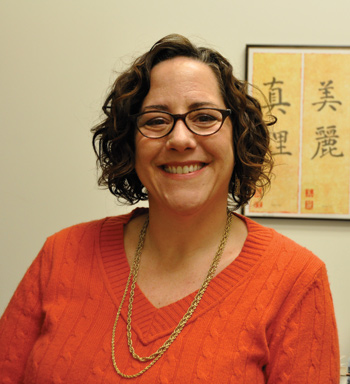By most modern standards, Lisa Cataldo had achieved success.

After receiving an M.B.A. from Columbia University, she secured a job in Manhattan working for Chemical Bank and spent the next eight years carving out her place in the world of corporate real estate financing.
Something, however, was lacking.
“On some level I didn’t feel fulfilled, and I didn’t feel like I was contributing anything to the world,” said Cataldo, Ph.D., assistant professor of pastoral counseling at the Graduate School of Religion and Religious Education (GRE) and a licensed psychoanalyst. “Ultimately, it just didn’t feel like me.”
She quit her job and traveled about as far away from corporate real estate as she could get: India and Nepal. For several months, she journeyed on a spiritual pilgrimage, visiting temples, monasteries, ashrams, and other places of worship, hoping that one of them might contain the missing piece.
“I was very interested in spirituality, and that study of eastern religions ultimately brought me home to my Christian roots,” she said.
Entertaining the idea of pursuing theology, she returned to New York, taking inspiration from a speech given by the late priest and spiritual writer Henri Nouwen. Nouwen was pastor of L’Arche Daybreak Toronto, a community for individuals with cognitive disabilities and the volunteers who assist them.
“I went there on a retreat because I was attracted to the idea of this place,” said Cataldo. “But once I got there, I realized it wasn’t an idea—it was real life. And I had to move in.”
Cataldo stayed for several months, and remains closely connected with L’Arche. “It was a real, lived experience. It wasn’t just going to ashrams and meditating. This was about how real spiritual growth takes place in relationship with other people, who show you what it means to be human.”
She returned, again, to Manhattan and enrolled at Union Theological Seminary to study psychology and religion. Her own experience in psychoanalysis, coupled with her experiences both in India and Toronto, drew her to the disciplines.
While some hold that the duo is incompatible, Cataldo considers psychology and religion a natural combination.
“In each of those worlds there are people that see the two disciplines as having a real basis for dialogue, because they both deal with higher-order questions: Who am I? What am I doing here? What’s my purpose? What’s meaningful in my life?” she said.
Trained in relational psychoanalysis—a branch that emphasizes interpersonal relationships in one’s life—Cataldo works today both as an academician and clinician to bridge the two domains.
Despite a growing interest in spirituality within the psychoanalytic community, Cataldo said, there is still no thorough understanding about religion and religious practice and their actual role in an individual’s experience. Some psychoanalysts—including Freud—reduce religion and spirituality to mere defense mechanisms against existential fears, but Cataldo maintains that faith facilitates the basic human need for connection and thus warrants higher regard.
“Whether the analyst is familiar with religion or not, a vast majority of the patients who come to see us have some kind of religious life,” she said. “And if we can’t make room for it without being reductive or dismissive, we’re really not making room for the patient as a whole person.”
In addition to helping the psychoanalytic community to better understand the connection between psychology and religion and spirituality, Cataldo also strives to illuminate the latter from a psychoanalytic standpoint.
“People experience life through their religion; but people also experience their religion through their psychology,” she said. “My primary work is to look at spiritual and religious experience through a psychoanalytic lens, without reducing it to a psychological phenomenon.
“As an analyst, I don’t advocate for religion or spirituality any more than I would advocate that a person should change careers, or get married, or get divorced,” she said. “I want to be curious with the person about what their spiritual life or religion means for them, how it functions for them, and whether it’s expansive or limiting.”
As a member of GRE faculty, Cataldo draws from her psychoanalytic training to shed light on theological issues. Her primary research addresses the multiplicity of self—images of ourselves that arise in response to our various experiences and relationships—and how this multiplicity yields diverse images of God. Her work questions the possible psychological influences that may contribute to the emphasis on the image of God as a father, rather than imaging God normatively as a mother.
Relatively novel in the worlds of psychoanalysis and religion, Cataldo’s views have been well received nonetheless. In June, she was awarded the Stephen A. Mitchell Author’s Award from the International Association for Relational Psychoanalysis and Psychotherapy. Next year she will lecture at Tao Fong Shan Christian Center in Hong Kong, which hosts the first program in psychotherapy and spirituality in China.
In the meantime, she continues to teach pastoral counseling, an area that particularly reveals the impact of uniting psychology and religion.
“In places where there are very few mental health services, or people are reluctant to use them, having the clergy trained to do counseling and pastoral care from a deeper base of knowledge, and then teaching people in their home diocese about this—it’s actually changing the world, one person at a time.”
